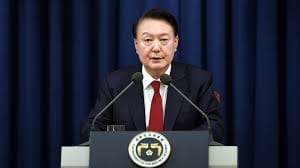Democracy in crisis: Korean government on the brink

On Tuesday morning (EST), South Korean President Yoon Suk Yeol declared martial law across the nation. According to the Government Office of Justice, martial law is "the temporary substitution of military authority for civilian rule," typically invoked during times of war, rebellion, or national crisis. Under martial law, military leaders assume sweeping powers to enforce laws and govern without civilian oversight. This declaration effectively means that President Yoon, with the support of the military, now holds unprecedented control over the country.
The decision comes amid deep political divisions within South Korea. President Yoon's party, the far-right People Power Party, holds a minority in the 22nd National Assembly. This minority status has led to a legislative deadlock, with little to no agreement between the president and the opposition on key issues. In his martial law announcement, President Yoon expressed frustration with the political gridlock, accusing opposition lawmakers of "paralyzing the judiciary by intimidating judges and impeaching prosecutors." He also criticized disagreements over the national budget, claiming that such disputes were endangering the nation's stability. These internal political tensions appear to have driven Yoon’s drastic move.
The declaration of martial law has been met with widespread condemnation both at home and abroad. South Korea has long been a key ally to Western nations, and many world leaders have voiced strong opposition to the president's actions. Domestically, protests have erupted across the country, with citizens taking to the streets and storming government buildings, demanding Yoon's resignation. These protests have led to violent clashes with military forces, highlighting the growing unrest within the nation.
In response to the declaration, the National Assembly passed a resolution calling for the revocation of martial law. However, the legislature’s authority to counter the president’s actions has been effectively neutralized, as military control now supersedes civilian governance. Despite the parliamentary resolution, President Yoon, hours later, pledged to remove martial law—though the implications of his earlier declaration remain significant.
This unfolding situation underscores the fragility of democracy in the face of political instability. South Korea’s experience serves as a critical reminder of the potential risks posed to democratic institutions when power is concentrated in the hands of one individual, especially during times of division and crisis. As the nation grapples with these developments, the international community must remain vigilant in safeguarding democratic principles and preventing the erosion of freedoms.





